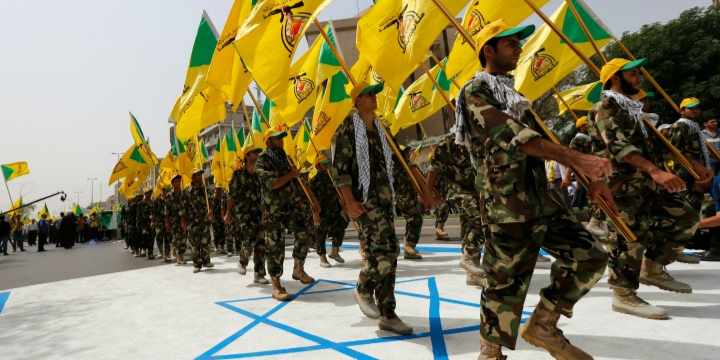The IDF Could Be Making a Horrible Mistake if It Doesn’t Confront Hezbollah
 by Yoav Limor / JNS.org
by Yoav Limor / JNS.org

Iraqi Shiite Muslim men from the Iran-backed group Kataib Hezbollah march in a Quds Day parade, in Baghdad, July 25, 2014. Photo: Reuters / Thaier al-Sudani.
JNS.org – After a Hezbollah anti-aircraft missile was fired at an IDF drone on a reconnaissance mission over Lebanon on Wednesday, Israel has found itself facing a dilemma. On the one hand, not retaliating will undermine its deterrence on the northern border. On the other hand, this might escalate tensions in a region already on edge.
Wednesday’s incident was not the first time Hezbollah has targeted Israeli drones operating over Lebanon. In the past, however, it has acted within a clear context and for an understandable reason, which was not the case on Wednesday. Although the Israeli Air Force (IAF) has been operating intensively in Lebanese airspace in recent days, it was known in Lebanon to be routine rather than hostile activity.
It seems that Hezbollah was trying to deter Israel and fulfill leader Hassan Nasrallah’s promise to target Israeli aircraft operating in the Lebanese airspace. It might also have been an attempt at payback for Israel’s attack on the Damascus airport last summer, which resulted in months-long tensions on the border.
Claims that Hezbollah’s actions were meant as a signal to the Biden administration to make haste in lifting sanctions on the group’s patron, Iran, are less plausible. The exact opposite might be true: Iran is interested in Lebanon remaining under the radar at the moment, as Israel links Hezbollah “tourism” to the Iranian nuclear deal, which the Biden administration has expressed a desire to rejoin.
Wednesday’s fire was apparently carried out using Russian anti-aircraft batteries previously smuggled into Lebanon. Hezbollah has so far used them sparingly, so as not to provoke Russia’s anger and to preserve this strategic weapon for a rainy day. It is unclear why the IAF refrained from destroying the battery. Anti-aircraft weapons have for years been defined as game-changing, along with precision-kill weapons and anti-ship missiles, and Israel is putting tremendous effort into preventing their transfer to Hezbollah.
Wednesday’s debates over a possible retaliation conveyed a certain hesitation. Refraining from reacting to the incident will send a message to Hezbollah that the action is acceptable, which might result in more attacks. If so, it will only result in the need for Israel to retaliate much more harshly at a later date, leading to an even larger escalation.
Of course, retaliation could also lead to an immediate escalation. This is a calculated risk that Israel must take into account, even at the cost of a few days’ fighting in the north. Hezbollah will certainly conduct itself based on Israel’s response, although one struggles to understand why Hezbollah would be interested in a conflict at this time in the first place.
Lebanon is on the verge of an economic and health collapse. Hezbollah is preoccupied with international problems and is very unlikely to gain public sympathy if it drags the nation into a bloody clash at this time. Following the Damascus airport strike last summer, Hezbollah tried to carry out a sniper attack on the Gladiola outpost on the Israel-Lebanon border. Three Hezbollah fighters came near the outpost to kill Israeli soldiers. The IDF, which tracked them entering Israeli territory, decided not to eliminate or capture them but let them flee, allowing Hezbollah to roll back a foolish step.
The move provoked the condemnation of the military echelon, which wondered if the political-security elite has lost its will to fight altogether.
Wednesday’s drone attack shows that it’s unlikely Hezbollah understood the message. The organization did not initiate an escalation, but it continues to challenge and sting Israel and shape new rules in the region. The IDF needs to sharpen its message.
Yoav Limor is a veteran Israeli journalist and columnist for Israel Hayom. This article first appeared in Israel Hayom.
 Cultural Center Backed by Iran’s Revolutionary Guard Plans to Produce Films About Attack on Israel
Cultural Center Backed by Iran’s Revolutionary Guard Plans to Produce Films About Attack on Israel How Does Ilhan Omar Really Feel About Iran?
How Does Ilhan Omar Really Feel About Iran? This Passover, Combine Respect for Tradition with the Courage to Innovate
This Passover, Combine Respect for Tradition with the Courage to Innovate Israel’s Iran Attack Carefully Calibrated After Internal Splits, US Pressure
Israel’s Iran Attack Carefully Calibrated After Internal Splits, US Pressure Palestinian Cameramen Exposed in New Footage Documenting Oct. 7 Atrocities Side by Side with Terrorists
Palestinian Cameramen Exposed in New Footage Documenting Oct. 7 Atrocities Side by Side with Terrorists US Money to Convicted Terrorists; US Training to Aspiring Terrorists
US Money to Convicted Terrorists; US Training to Aspiring Terrorists Man Arrested in Paris After Iran Consulate Incident
Man Arrested in Paris After Iran Consulate Incident Amazon Pulls Book by Hamas Leader Yahya Sinwar Referencing Oct. 7 Attacks After UK Lawyers Intervene
Amazon Pulls Book by Hamas Leader Yahya Sinwar Referencing Oct. 7 Attacks After UK Lawyers Intervene Israeli Government Approves Increased Payments to Returned Gaza Hostages
Israeli Government Approves Increased Payments to Returned Gaza Hostages Tehran Signals No Retaliation Against Israel After Drones Attack Iran
Tehran Signals No Retaliation Against Israel After Drones Attack Iran



 Man Arrested in Paris After Iran Consulate Incident
Man Arrested in Paris After Iran Consulate Incident US Money to Convicted Terrorists; US Training to Aspiring Terrorists
US Money to Convicted Terrorists; US Training to Aspiring Terrorists Palestinian Cameramen Exposed in New Footage Documenting Oct. 7 Atrocities Side by Side with Terrorists
Palestinian Cameramen Exposed in New Footage Documenting Oct. 7 Atrocities Side by Side with Terrorists US to Oppose Palestinian Bid for Full UN Membership
US to Oppose Palestinian Bid for Full UN Membership Israel’s Iran Attack Carefully Calibrated After Internal Splits, US Pressure
Israel’s Iran Attack Carefully Calibrated After Internal Splits, US Pressure